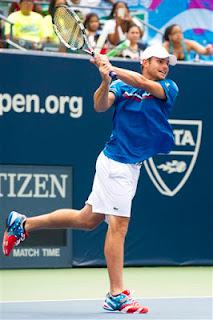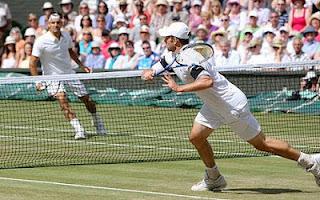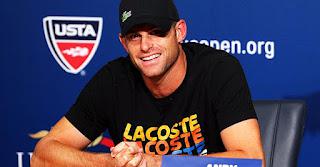by Conroy

Andy Roddick at the 2012 U.S. Open
Andy Roddick lost yesterday – after a characteristically hard fight – in the fourth round of the U.S. Open, beaten decisively by 2009 champion Juan Martin Del Potro in the conclusion of their rain-interrupted match from last night. It is the last match, the final loss, of his career. Roddick surprised the sports world when he announced his retirement prior to his second round match. He cited the increasing frequency of injuries and his flagging commitment as the key factors driving his decision. Unlike other past champions1, Roddick said he wouldn’t be satisfied to, in his words, merely “exist on tour.” Roddick’s results have been slipping over the last year and a half and he’s been sidelined, seemingly, by one injury after another. This has led to whispers and speculation about how long Roddick would keep going, so it wasn’t a huge shock when he announced his decision to call it a career, but the timing – right in the middle of the biggest American tournament of the year – was unexpected. It added a buzz to his final matches as the New York crowd had only these last few opportunities to cheer him on. But it also provides an opportunity to reflect on Roddick’s long, successful, and in many ways frustrating career.
I’ve written a lot about tennis on this blog, but I’ve always focused on the play and changing dynamics of the very top players, especially Roger Federer, Rafael Nadal, and Novak Djokovic. My interest in the top of the game is natural; these have been the men winning the big titles and etching their many impressive accomplishments in the tennis history books. Over the last seven plus years they’ve won just about every tournament of importance, leaving precious little for the rest of the field. Andy Roddick has been one of those players left in their wake. Compared to the best he has been, by any clear-eyed assessment, a minor champion. But it didn’t look this way when Roddick broke onto the scene.
Andy and Roger
It’s impossible to consider Roddick’s career without comparison with his direct contemporary, Roger Federer. Federer has of course dominated tennis for most of the last decade, and his stature and accomplishments have overshadowed all others (with the lone exception of Nadal). But no one’s career has suffered from Federer’s dominance as much as Roddick’s.
Ten years ago, 20-year-old Roddick shot into the top ten behind a monstrous serve and forehand. Back then Roddick could hit his serve at over 150 mph2, and his serve-forehand combination was hard to contend with. He looked to have the game to be the next big thing, picking up the torch of American tennis from the aging Andre Agassi and Pete Sampras. Of course there was another guy who had settled into the top ten who was also being called the next big thing3. And unfortunately for Roddick, this other guy had his number. Federer beat Roddick the first four times they played, including in the semi-finals of the 2003 Wimbledon en route to his first grand slam. Still, the Roddick-Federer matchup promised to be one of the great new rivalries in the sport.
Roddick finally beat Federer in the run-up to the 2003 U.S. Open, and carried that momentum4to the championship, the first of what looked to be many grand slam titles. Roddick’s victory in New York and his overall season lifted him to the top of the rankings for the 2003 season, one spot ahead of Federer. At 215he was the best player in the world.
Federer took the top ranking from Roddick in early 2004 after he won his second grand slam at the Australian Open, but in midsummer at Wimbledon Roddick had a great chance to get on top of their burgeoning rivalry. He faced Federer in the Wimbledon final. A victory would avenge his semi-final loss from the year before and give him two grand slams, equal to Federer, and the number 1 ranking. The match was played under sodden gray skies, but the gloomy weather didn’t seem to faze Roddick. He came out playing brilliant tennis, serving masterfully and striking rocket forehands on the way to taking the first set. He had Federer back on his heels and was getting the better of many of the baseline exchanges. Federer managed to squeeze out the second, but Roddick was leading 4-2 in the third when the skies, threatening rain all day, finally opened. Roddick left the court with the initiative, and it’s worth pausing at this moment; perhaps the high water mark of his career, beating Roger Federer at Wimbledon, on the cusp of a career-defining victory. But it wasn’t to be. Federer used the rain delay to his advantage, diagnosing Roddick’s game plan. When play resumed he changed tactics by attacking the net and seized the momentum. He broke Roddick immediately and took the third set in a one-sided tiebreaker. Federer’s maintained his level and served out the match in four sets. Right up until this Wimbledon final there was little to choose between the players, Roddick had potent weapons and Federer had a formidably all-around game. But from this match on their career trajectories bifurcated sharply; Roddick would never again be in Federer’s league.
Federer went on to dominate in a historic fashion, winning more grand slam titles and holding the top ranking for longer than any other man. Roddick began a slow fade. He ended 2004 ranked number 2, but was passed by Nadal in 2005, and then by others in the ensuing years. He reached the 2005 Wimbledon and 2006 U.S. Open finals6, and was beaten by Federer in each. Roddick continued to win, but never seemed to come through in the big matches. His (relatively) plodding movement and underpowered backhand were weaknesses that more and more players learned to exploit. Even his vaunted serve and forehand seemed to lose a little of their sting as the years passed. His year-end ranking shows this steady (if relatively slow) decline:
- 2003 – 1,
- 2004 – 2,
- 2005 – 3,
- 2006 – 6,
- 2007 – 6,
- 2008 – 8,
- 2009 – 7,
- 2010 – 8,
- 2011 – 14,
- 2012 (as of 9/4) – 22.
By summer 2009 it was clear to everyone that Federer was among the greatest players of all time, a true tennis icon whose accomplishments and athletic talent transcended the sport. Roddick had merely been a very good, very consistent top 10 player. When Roddick fought his way to the 2009 Wimbledon final, against Federer of course, each man had a huge goal to play for. For Federer, a win would give him 15 grand slam titles, passing the record he shared with Pete Sampras. For Roddick, a win would give him an elusive second grand slam title, banishing the label of a “one slam wonder”, a coveted Wimbledon championship, and validate his long presence in the top 10. Pre-match pundits (including this writer) tagged Federer as a big favorite. After all, Federer led their head-to-head matchup 18-2, including all seven of their grand slam matches. But Roddick was game and the match became epic.

Roddick and Federer in the 2009 Wimbledon final
Playing under bright sunshine, Roddick surprised Federer by playing clean, aggressive tennis. As he said after the match, for perhaps the first time ever Federer seemed unable to read his serve. And Roddick was able to hold his own in the baseline rallies as well, preventing Federer from dragging him all over the court, pushing Federer and never letting him find the easy flow he usually established in their matches (watch highlights here). Roddick broke Federer at the end of a tight first set to take it 7-5. His high level continued in the second as he dominated on his own serve. The set went to a tiebreaker where Roddick built a seemingly insurmountable 6-2 lead – holding four set points. Just then it seemed that their history intervened. Federer fought off all four set points, aided by a Roddick volley error on what appeared to be an easy put away, and won the set. Instead of Roddick holding a commanding two sets to none lead, the match was all square and the momentum surely behind Federer. But Roddick’s level stayed high, even as Federer won the third set in another (not as close) tiebreak. And unlike in so many of their previous matches, Roddick didn’t wilt after falling behind. He continued to hold serve – Federer hadn’t broken him once in the match – and scored a break of Federer’s serve midway through the fourth set. Roddick served it out and the match moved, unexpectedly, into a fifth set. The games mounted, each man holding serve game after serve game. They reach 6 all, then 9 all, then 12 all. Roddick actually had a few chances to break Federer, but each time the Swiss man fought them off. Finally, with Federer leading 15-14, Roddick’s serve faltered. Federer broke him, after 37 consecutive holds, to take the win7. It might have been the best match of Roddick’s career, and he lost. The result was in many ways a microcosm of his career (and Federer’s), coming so close to greatness only to lose to someone better.
An Excellent Career
Because Roddick lost so often to Federer and in so many big moments, there is a tendency among some tennis fans to view his career as a bit disappointing. He never won a second grand slam. After 2003 he never really had any moments of glory. This perspective is a commentary on our winning-is-everything sports culture. No matter what Roddick accomplished he never won the big match. But while this is true, it shouldn’t obscure the many notable achievements in Roddick’s career. He carried the flag as America’s best tennis player for a decade. He was a stalwart in Davis Cup, often playing for the U.S. even if it meant less rest and preparation for the remainder of his season. He led the American team to the 2007 Davis Cup title, which surely ranks as one of the finer moments of his career. Here are a few of his more noteworthy accomplishments:
- Won the 2003 U.S. Open,
- Won 32 career titles (third among active players behind only Federer and Nadal),
- Won five ATP 1000 titles,
- Finished the year ranked in the Top 10 for nine consecutive years (2002-10),
- Won at least one tournament for 12 consecutive years (2001-12),
- Won more than $20 million in prize money.
It’s perverse to cast this type of success as a disappointment. By the standards of most tennis players these achievements represent outstanding success that only a handful of professionals will achieve. Tennis narratives, like most sports narratives, are told from the top. We follow the exploits of the best players; we focus on the biggest tournaments and watch the championship matches. Roddick, unfortunately, didn’t shine in most of those moments, but he still has to be considered one of the top half dozen players of the last decade. Maybe the reality is that as spectators we see in Roddick much of what we see in ourselves, which is not the best, more likely to lose than win8, to come up a little short in the biggest moments. We see in Federer what we want to be, extreme competence and confidence, a man able to summon his best when his best is needed most, a winner. And so we relegate Roddick to second-rate status and venerate Federer. Roddick deserves a better fate than that.
Andy was (is) also a natural character. His game matched his aggressive, strutting on-court demeanor; a demeanor that many found very American, especially compared to, say, the calm and precision of Swiss Federer and the bullish fight of Spaniard Nadal. When you think of Roddick on court, it’s hard not to imagine him toeing the service line, sweat pouring off the brim of his baseball cap, pulling at the shoulders of his too-large shirt, flipping the ball out of his hand and bouncing it quickly with his racket. His narrow stance and deep knee bend as he uncoiled in a flash to unleash a thunderous serve. Or maybe we’ll remember his fearless diving volleys at the net, a crowd-pleasing and no doubt painful move that he surely performed more frequently than any other player. Or maybe the way he seemed to alternately stomp and skip back to the baseline after points, a characteristic roll in his shoulders, exhorting the ball boy for his towel with an emphatic point. And when he got the towel his habit of wiping down his right (racket) arm and hat in a vain attempt to staunch his perspiration. Or the moments of anger and frustration when he berated the umpire for some perceived slight or error. Andy had a style to him, it wasn’t elegant or subtle it was brash and bold and often in the face of superior opponents, ineffectual, but it was his own.

Andy, often at his best with the press
His press conferences were always fun as he actually engaged reporters, the setting perfect for his quick wit. After the 2004 Wimbledon loss he quipped, “I threw the kitchen sink at [Federer]. But he went to the bathroom and got a tub.” Even after a deflating loss he could be ingratiating and funny. That attitude and sense of humor was one of his most admirable qualities. His long career near the top and natural rapport with the media made him one of the most recognizable faces in the sport, and I think he did more to lift tennis in the broad cultural consciousness then many other players with similar levels of success. He was a tireless worker and never stopped looking for answers to the puzzle of Federer and other top players, bringing on new coaches, focusing on correcting flaws in his game. It’s not obvious that all of this effort led to greater success, but at the end of the day (or at the end of the career), Roddick can hold his head high knowing that he likely got the most out of his talent and game. The tennis tour will be worse off for Roddick’s absence, and American tennis will miss his leadership. But the tour will move on, hopefully we’ll see Roddick stay in touch with the game in some capacity. Until then, farewell, Andy Roddick, you will be missed.
---
NOTES:
1. Like Lleyton Hewitt or Juan Carlos Ferrero, who both, like Roddick, are grand slam champions and former number 1 ranked players, and who experienced their best seasons a decade or more ago and yet continue to toil on despite frequent losses and with little hope of winning tournaments.
2. He still holds the record for fastest serve at a grand slam – 152 mph at the 2004 U.S. Open, and the second fastest serve ever at 155 mph.
3.Federer if that’s not obvious.
4.Including saving a match point against David Nalbandian in the semi-finals. Roddick manhandled Juan Carlos Ferrero in the final.
5.Roddick (DOB. 8/30/82) is just over a year younger than Federer (DOB. 8/8/81).
6. The 2005 Wimbledon final, which wasn’t close with Federer winning in a straight-set blowout. The 2006 U.S. Open final which saw two close sets sandwiched between two dominant sets from Federer, who won in four sets. And the 2009 Wimbledon final, described in detail above.
7. The final score line was 5-7, 7-6(6), 7-6(4), 3-6, 16-14. The final was the longest in grand slam history in terms of games played and the fifth set lasted more than an hour and a half. (A personal aside: I was on vacation in Ireland when this match was played and made my friend sit and watch the entire four-and-a-half hour marathon from a pub in Dublin. Surely this was not his idea of how to spend a weekend afternoon in a foreign city, but to his eternal credit, he was a good sport and toughed out the whole thing with nary and complaint. Later, I got into a conversation with an Irish woman who was saddened by Roddick’s loss. She felt that he had deserved to win, especially since Federer had won so much and one extra championship couldn’t have meant as much to him as a Wimbledon title would have meant to Roddick. She was surprised to know that I, and American, was cheering for Federer instead of my countryman. But as I explained, I don’t consider tennis a nationalistic sport (like, say, the Olympics) and where an individual player hails from is less important than how they play, and behave, and for lack of a better description, how likeable and enjoyable they are to watch. I think many or even most tennis fans feel the same way.)
8.This assumes of course that we can consider a man who is famous, wealthy, and more successful than 99.9% of the people in his profession as something less than a winner. And let’s not forget that his wife is a supermodel.

